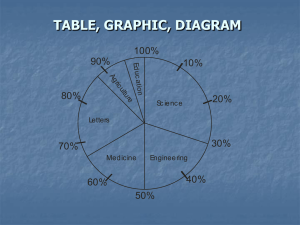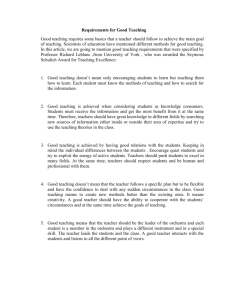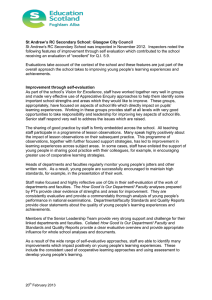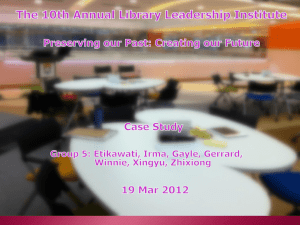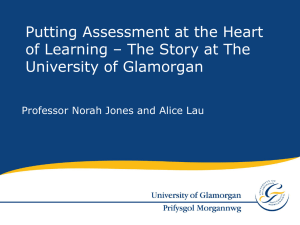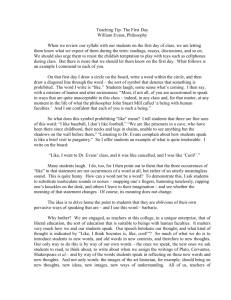Graduation Ceremony 9 Friday 28thNovember 2014 at 4.30 p.m.
advertisement
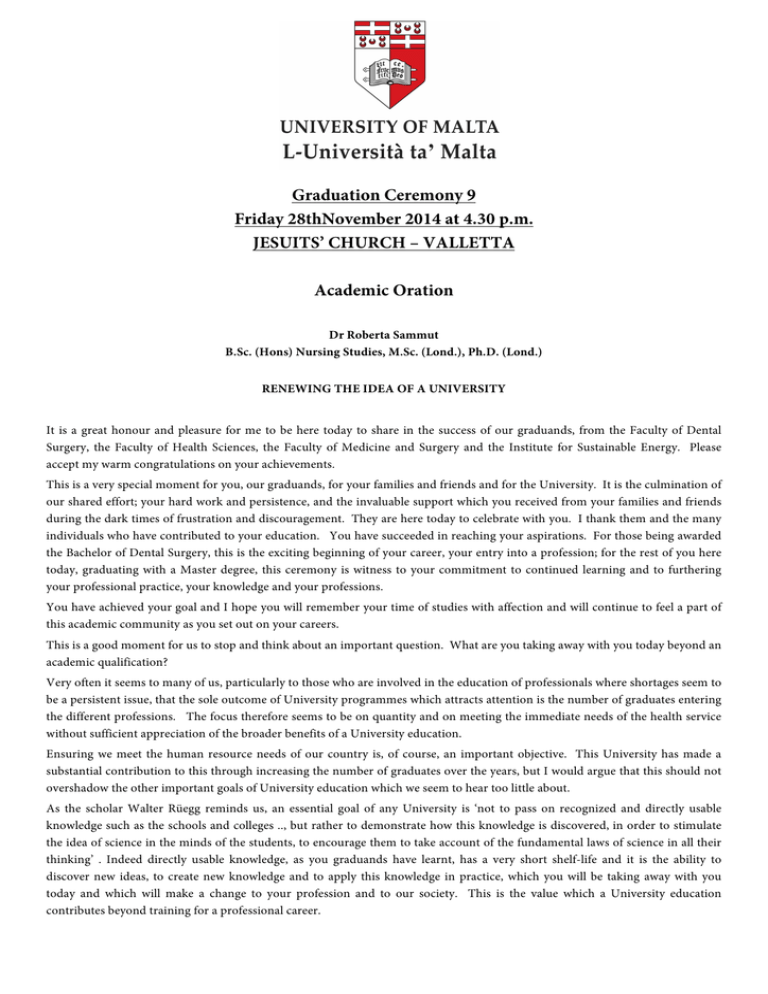
Graduation Ceremony 9 Friday 28thNovember 2014 at 4.30 p.m. JESUITS’ CHURCH – VALLETTA Academic Oration Dr Roberta Sammut B.Sc. (Hons) Nursing Studies, M.Sc. (Lond.), Ph.D. (Lond.) RENEWING THE IDEA OF A UNIVERSITY It is a great honour and pleasure for me to be here today to share in the success of our graduands, from the Faculty of Dental Surgery, the Faculty of Health Sciences, the Faculty of Medicine and Surgery and the Institute for Sustainable Energy. Please accept my warm congratulations on your achievements. This is a very special moment for you, our graduands, for your families and friends and for the University. It is the culmination of our shared effort; your hard work and persistence, and the invaluable support which you received from your families and friends during the dark times of frustration and discouragement. They are here today to celebrate with you. I thank them and the many individuals who have contributed to your education. You have succeeded in reaching your aspirations. For those being awarded the Bachelor of Dental Surgery, this is the exciting beginning of your career, your entry into a profession; for the rest of you here today, graduating with a Master degree, this ceremony is witness to your commitment to continued learning and to furthering your professional practice, your knowledge and your professions. You have achieved your goal and I hope you will remember your time of studies with affection and will continue to feel a part of this academic community as you set out on your careers. This is a good moment for us to stop and think about an important question. What are you taking away with you today beyond an academic qualification? Very often it seems to many of us, particularly to those who are involved in the education of professionals where shortages seem to be a persistent issue, that the sole outcome of University programmes which attracts attention is the number of graduates entering the different professions. The focus therefore seems to be on quantity and on meeting the immediate needs of the health service without sufficient appreciation of the broader benefits of a University education. Ensuring we meet the human resource needs of our country is, of course, an important objective. This University has made a substantial contribution to this through increasing the number of graduates over the years, but I would argue that this should not overshadow the other important goals of University education which we seem to hear too little about. As the scholar Walter Rüegg reminds us, an essential goal of any University is ‘not to pass on recognized and directly usable knowledge such as the schools and colleges .., but rather to demonstrate how this knowledge is discovered, in order to stimulate the idea of science in the minds of the students, to encourage them to take account of the fundamental laws of science in all their thinking’ . Indeed directly usable knowledge, as you graduands have learnt, has a very short shelf-life and it is the ability to discover new ideas, to create new knowledge and to apply this knowledge in practice, which you will be taking away with you today and which will make a change to your profession and to our society. This is the value which a University education contributes beyond training for a professional career. Cognitive and intellectual abilities are not the sole goal of student education at University level. John Henry Newman stated ‘if then a practical end must be assigned to a university course, I say it is that of training good members of society’. Your education has not simply given you the professional skills to allow you to practise your respective professions, but has sought to give you a wide range of skills which you will use in your everyday and professional lives; amongst these, the ability to express your ideas and to listen to others’ with tolerance to diversity in thought and being, the ability to lead and to work effectively with others, the ability to understand others’ emotions and to respond effectively and an understanding of what it is to be a person of integrity, true to your values. It is these abilities which shape the kind of professional you are, which differentiate the excellent from the mediocre and which will mean so much to those who receive a service from you and our society at large. The outcomes of university education which I have addressed so far are only part of the goals of universities, goals which change over time in response to changing societal needs and contexts. Indeed universities globally, including our own, are living through a time of transition; a fundamental change in ‘the idea of a university’ which many of us are probably unaware of. This puts us at risk of being taken by surprise rather than acting proactively. The Rector of the University of Malta referred to this transition at the signing of the 2014-18 collective agreement for academic staff last summer, when he stated that this agreement would continue to pave the way towards a third generation university. The transition to a third generation university is viewed as being essential in promoting economic growth within European countries and at this point is projected as being both ‘inevitable and desirable’ , as in many ways it addresses the current challenges to universities, particularly the exponential growth in student numbers, and the concomitant difficulties of national governments to adequately fund universities. What does this new model of a university mean to the Faculties represented here today? The model of a third generation university includes, as previous models, student education, but with a focus on cultural diversity within the student and academic body. It similarly includes research but with a focus on trans-disciplinary research, initiated by and carried out in collaboration with industry. The added dimension of a third generation university is the commercialization of know-how generated through research. Whilst this may sound very new, elements of this transition are already present within our Faculties and University and provide examples of good practice which can stimulate further development. A third generation university has a cosmopolitan outlook, seeking to attract students from across the globe. Although across the University, as a whole, the number of non-Maltese, European and non-European students has increased, most of our Faculties still have a restricted catchment, attracting mainly local students. The Faculty of Medicine and Surgery has set the pace in this regard with the recruitment of students from Kuwait, Oman and Saudi Arabia. Other Faculties may have much to learn from this. Diversity within the student population is desirable in view of the richness it brings to the learning experience. There is here much scope for development, particularly through the utilization of online learning, where geographical distances are not an object. The Department of Nursing has run an online degree for several years; this has to date been offered to local students, yet there is no reason why such programmes should not be made available on a global scale. Research within a third generation university is stimulated by industry or service providers. Much of the research carried out within most of our departments is initiated by academics on the basis of the individual’s particular interests. Within a third generation university, it is industry or the service providers that determine which research is needed and consequently which research will be funded. Some may complain that this will limit academic freedom, but a major benefit is that it will make alternative funds for research available through university/industry collaboration. Such research is more likely to be implemented, increasing its value to society. This sets the challenge for our Faculties to reach out to service providers and industry to seek opportunities for collaboration. Whilst such collaboration is already present in terms of student teaching, there is little such joint effort in terms of research. The University of Malta already has the resources to support our Faculties in such activities. These include the Knowledge Transfer Office set up in 2009, which facilitates the process of forming collaborative agreements with industry and the Research, Innovation and Development Trust set up in 2011 which seeks funds from private industry and individuals, to support high standard research. A key characteristic of a third generation university is that research is not mono-disciplinary as is frequent practice at present; trans-disciplinary research is viewed as being essential in this model as this adds value and richness to the knowledge being created. Edward Osborne Wilson refers to this as ‘consilience’, the drawing together of knowledge from different disciplines to produce comprehensive theories, more complete knowledge. This requires academics to work across Faculties. Such examples are still rare across our Faculties, but a notable example of good practice is the Diabetes Foot Research Group, which includes researchers from the Faculty of Health Sciences, the Faculty of Medicine and Surgery and the Faculty of Engineering in collaboration with the Faculty of Health at Staffordshire University in the United Kingdom. This collaboration allows the sharing of precious resources, both material and human, and adds value to research. The research programmes within a third generation university provide the basis for the development of programmes of studies. These include the contribution of different academics from across the Faculties and inter-disciplinary teaching and learning. Whilst the concept of inter-disciplinary learning has long been with us, this has not, as yet, been widely implemented across and within our Faculties. An example of a gold standard in this aspect is the Master of Science in Audiology offered by the Department of Communication Therapy. The current student cohort includes Speech and Language Pathologists, Ear Nose and Throat surgeons and physiological measurement scientists. The experience of this inter-disciplinary programme has been very positive, showing true collaboration between students of different professional backgrounds who contribute their specific knowledge and experience to the group, promoting mutual academic and professional growth and development. There is space for the development of similar post-graduate inter-disciplinary programmes, particularly since teamwork is so important to the provision of health care services. The application of know-how is the third important element of a third generation university. Our university already provides support for this; June 2013 saw the launch of the Centre for Entrepreneurship and Business Incubation which provides assistance in launching new enterprises, particularly in the initial phases. This aspect of a third generation university perhaps creates the greatest challenge to those professions, such as nursing, for whom commercialization of knowledge is viewed to be antithetical to the values of the profession, the nature of its knowledge, which includes a strong social science background, and to the usual way by which know-how is disseminated and implemented. This challenge however is perhaps due to the terminology frequently used in relation to this goal, such as techno-startups, technology transfer and commercialization of knowledge. These terms could be adapted to allow wider acceptability of this idea, with the use of terms such as knowledge transfer rather than commercialization. It could also include a broader understanding of know-how application beyond technology, to include, for example, processes of care which can be diffused in collaboration with service providers. In summary the new model of a university which is slowly evolving presents to us many challenges, but also many exciting opportunities including collaboration with service providers, trans-disciplinary research and teaching and the application of knowledge. Finally I turn back to our graduands. This is also an exciting time for you. I wish each of you a fulfilling and rewarding career; may you gain a reputation for your professional competence, achievements and contribution to your respective professions, but above all, I hope that you will be known for your compassion towards those you serve and for your professional integrity. As Albert Einstein advised ‘try not to become a man (or woman) of success, but rather try to become a man (or woman) of value’.
